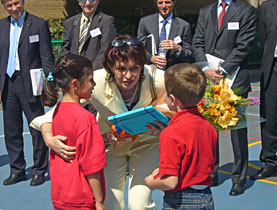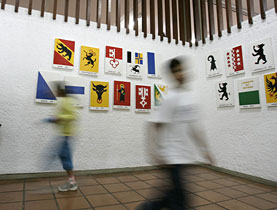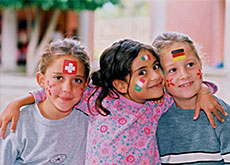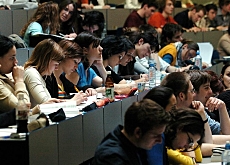Matterhorn and Popocatépetl meet in classroom

Swiss schools abroad are regarded as cultural flagships, exporting traditional values across the continents and attracting expats as well as locals.
The Colegio Suizo in Mexico City, with its two subsidiaries in Cuernavaca and Querétaro, is the largest institution of its kind in the world. For more than 40 years its classrooms have been a melting pot of Latin American and northern European temperaments.
Posters of the Matterhorn mountain, Lucerne’s Chapel bridge or the famous Chillon castle on Lake Geneva bring a touch of the homeland. Not to mention the Swiss flags or the young children singing Swiss folksongs.
For the visit of a delegation led by Economics Minister Doris Leuthard earlier this year, the Colegio was wearing its Sunday best. But the school aims to do more than give postcard impressions of the alpine country.
“The children and students here get quite a broad picture of Switzerland over the years,” says Bettina Huber, a primary school teacher who has lived in Mexico for about eight years.
Many parents send their children to Switzerland for a language course or they take them on holiday to Europe. The school also organises summer camps in Switzerland and encourages student exchanges.
“Personal experience of everyday life in Switzerland, and face-to-face contact with the people is crucial,” says Franco Donati, a chemistry teacher. “Upon their return to Mexico, the students invariably say their year abroad was the best thing that had happened to them.”
Swiss values
Ambros Hollenstein, director of the school, says it is one of the key tasks of a Swiss school abroad to provide an enduring image of the country.
“Our students are future decision-makers in politics, business and culture. Many study at a Swiss university or work for Swiss companies,” says Hollenstein.
He highlights the importance of values commonly associated with Switzerland: reliability, punctuality, discipline, personal commitment and integrity.
“Our school believes in a performance-oriented approach,” says Hollenstein. “This is unusual for Mexico and probably distinguishes us from other private schools.”
For Hollenstein it is a policy which has proved to be successful.
The Colegio Suizo has gradually opened its doors to members of the local population looking for private education. Partly this was inevitable, as the number of Swiss pupils has been on the decrease since the 1990s and subsidies have dropped as a result.
Subsidies
Although it has become harder to survive amid competition, the school is becoming less dependent on the decisions of Swiss politicians, says Hollenstein. He advocates a change in the system of subsidies to include other criteria than simply a “headcount quota”.
“It might be more complex to define a list of goals a school has to achieve to qualify for state funds, but I’m sure it would be a step ahead.”
Hollenstein, who quits his job after eight years in Mexico to return to Switzerland in the summer, says the academic achievements of the Colegio are clear.
“But quality is not only what can be measured and marked.” The school is also proud of its extra curricular activities, be it sport competitions or cultural events such as the annual school play.
“I’m the last person to say that every Swiss school abroad should follow our example. But it works for us.”
He is confident about the next few years. The school looks set to expand further, including the purchase of property next to the compound in Mexico City.
“I don’t see existential problems for the school. But it’s clear we will need a certain tenacity to implement planned reforms of the exam system, the International Baccalaureate.”
Familiar
Huber says the Colegio is committed to competition and selection and that also defines her role as a teacher.
She points out that the atmosphere is more relaxed than in a school in Switzerland. “The children are affectionate and lively, and they hardly ever fight in the schoolyard.”
Donati points out that pupils and students are motivated to learn. “They come across as much less arrogant than in other private schools. It is not enough to pay the school fee, they have to pass tests and exams.”
But there is time for banter between teachers and students after class is out for the day. “She likes to tease me, but she is one of my best students,” says Donati as we walk past a group of teenagers outside the natural sciences department.
“I try to tell them what it was like when I was a teenager, and later an adult, in Switzerland,” says Donati about the role of an informal “ambassador” – as representatives of Swiss schools are referred to.
Huber, for her part, says she is often asked about her Swiss teaching methods or her marking.
“Being Swiss sometimes feels like being an endangered species, there are fewer and fewer of us here,” she says with a rueful smile.
swissinfo, Urs Geiser in Mexico City
There are 17 recognised Swiss schools around the world, mainly in Latin America.
A total of 6,700 students were enrolled in 2007.
Parliament has approved SFr20 million ($20 million) in subsidies for Swiss schools in 2008, up SFr3.4 million on 2007, despite opposition by the government.
Subsidies are granted according to the number of Swiss students at the school.
Swiss schools had an annual turnover of SFr63.7 million in 2006.
It was founded by Swiss expatriates in 1965 and has a total of 1,004 pupils.
The Swiss school in Mexico City, including its two subsidiaries, Cuernavaca and Querétaro, to the south and north of Mexico City, is the biggest of its kind.
About 24% of the students and pupils are Swiss and a third of the staff are Swiss. The majority of pupils and teachers are locals.
The Swiss school in Mexico provides education from pre-school level up to high school graduation.
The school, which highlights a multilingual and bi-cultural Swiss-Mexican approach, is run like a private firm. It is committed to a performance-orientated curriculum.
Children learn German at pre-school. French, a second official language in Switzerland, is taught at secondary school level alongside English.

In compliance with the JTI standards
More: SWI swissinfo.ch certified by the Journalism Trust Initiative




You can find an overview of ongoing debates with our journalists here. Please join us!
If you want to start a conversation about a topic raised in this article or want to report factual errors, email us at english@swissinfo.ch.